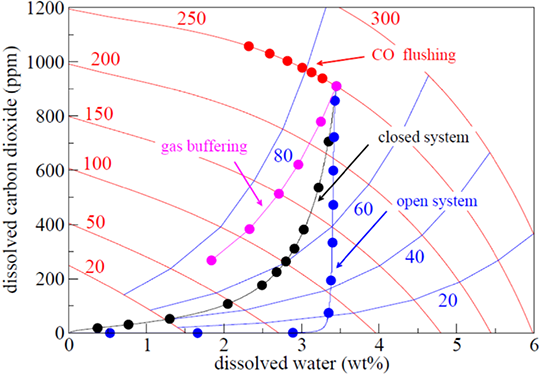Thermodynamics of Multi-component Gas-Melt Equilibrium in Magmas: Theory, Models, and Applications

Paolo Papale, Roberto Moretti, Antonio Paonita (2022).
Reviews in Mineralogy and Geochemistry, 87, 431-556, https://doi.org/10.2138/rmg.2022.87.10.
Abstract
Volatiles are the fuel and fundamental control for major processes involving magmas and volcanoes. Magmatic volatiles are not just transported by magmas. They do cause, to a large extent, magma transfer from deep regions to the surface, and do determine the associated dynamics. Accordingly, we strictly need a deep understanding of the behavior of volatiles in magmas, without which we would never penetrate the complex processes of magma ascent, evolution, and eruption.
Because of their crucial role in Earth history as well as in petrogenesis and volcanic eruption dynamics, magmatic volatiles have been the subject of countless studies. A complete treatment of the behavior of volatiles in magmas would require a book by itself, and it is largely beyond the scope of this contribution.
Here we focus on the thermodynamics of multi-component gas-melt equilibrium. First, we introduce the fundamental equations of equilibrium thermodynamics starting from basic principles. We then concentrate on fully real, multi-component thermodynamics, and on models based on regular solution approaches allowing the extreme compositional variability of silicate melts to be fully accounted for. After that, we discuss models that are based on speciation equations that treat solubility as the result of chemical reactions between the volatiles and the melt. A following section extends the equilibrium equations to minor components represented by noble gases. We conclude by illustrating several applications of volatile-melt thermodynamics to real problems in igneous petrology and volcanology.


Devi effettuare l'accesso per postare un commento.